When it comes to city passes and travel cards, it’s usually fairly easy to figure out whether they would be worth it for you or not. For things like the Paris Pass or London Pass, they have a list of the most popular attractions and how much they cost, right there for you to see. The Swiss Travel Pass, however, is shrouded in mystery, or at least it was until I spent several days tracking down all of the prices and benefits.
A great many of the visitors and commenters on my popular page about where to go in Switzerland on a short visit are wondering whether the Swiss Travel Pass is a good deal. Embarrassingly, I’ve always had to answer that I found the pass too confusing to confidently advise people on. Now that has all changed, after literally days of research.
Note: This article was last updated in February, 2024.
Disclosure: This is a reader-supported website and some of the links are affiliate links where a small commission is paid to help keep this site going, but the cost to visitors is the same. The Swiss Travel Pass seems quite expensive at first, so it felt like it might be hard to get your money’s worth out of it. As it turns out, it’s pretty easy to get good value, and it’ll be a good deal for many visitors.
New in 2024
Prices increased an average of 5.9% from 2023 on the Swiss Travel Passes, but the Half Fare Card remains at CHF120, which is where it’s been for many years. Train fares in the country increased by similar percentages so the value is basically unchanged. There were no other notable changes to service or the included attractions and train routes.
>>>Buy the Swiss Travel Pass online
Where to stay in Interlaken and the Lauterbrunnen Valley
Since most people reading this will be visiting the Interlaken area and I get so many questions about it, I decided to write a detailed guide on which area to stay in while visiting this area.
>>>Where to stay in Interlaken or the Lauterbrunnen Valley in Switzerland
I included many huge photos in that post so readers will be able to get a better idea of what each place looks like and they are worth a look by itself.
>>>Lucerne or Interlaken: Which to visit and how long to stay?
The article just above will help you decide on how long to spend in each of Switzerland’s two best tourist areas.
Are you 100% sure where you want to go in Switzerland? This should help
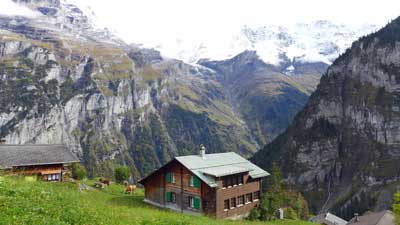
Zurich and Geneva are pleasant but dull. The good news is that Switzerland is packed with amazing sights and none of them are the big cities. If you aren’t 100% locked in yet, please read the article below and I think you’ll enjoy it.
Is the Swiss Travel Pass a good deal? Here's the short version

The bottom line is that the scenery, train journeys, and cable car rides in Switzerland are stunning and not found anywhere else in the world. They are also quite expensive if you pay for them one at a time. So no matter how you visit Switzerland, you are going to be paying quite a bit, or skipping the absolute best things that you’ve come there to see.
With good planning it’s quite easy to get great value out of a Swiss Travel Pass, but it might be a poor choice for those who don’t like to plan ahead. You can easily do a scenic train ride and a cable car in the same day, and still have time to do a scenic hike in the process.
First class or second class? Good news for most people
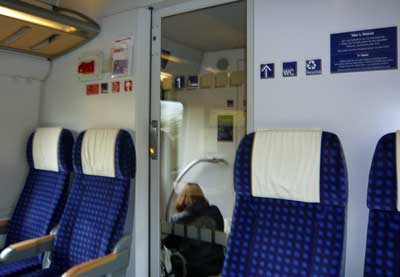
That said, Swiss Trains are literally the nicest in Europe and even the Second Class seats and carriages are nicer and roomier than trains in neighboring countries. The First Class seats are larger and nicer with only 3 across the cabin instead of 4, but honestly Second Class is perfectly comfortable for almost everyone.
Again, First Class on European trains like this is generally popular with business travelers where the company is paying and they need to get work done during the ride, and also senior citizens who don’t want to worry about a carriage full of backpackers. For most of the rest of us, Second Class is more than comfortable enough and the seat width and legroom compare to business-class airline seats. I’m a big and tall guy and I almost always travel in Second because it’s plenty comfortable enough and all the seats arrive at the same time anyway.
The longer you'll be in Switzerland, the better deal a Swiss Travel Pass will be
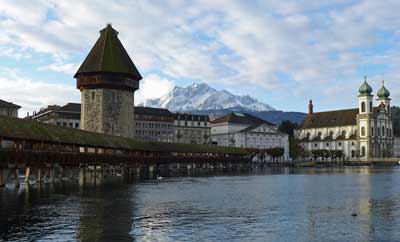
In other words, if you are staying 5 days or fewer, you have to do the math to determine your best option. But if you are spending even 6 or 7 days in Switzerland then the 6-day or 8-day Pass is almost guaranteed to be a great deal and your best choice. Once you have a Swiss Travel Pass you’ll absolutely love the ability to just hop on any train (excellent trains, always on time) and most boats and cable cars without having to worry about the cost. The per-day cost of an 8-day Pass even if you only use 6 of those days is about CHF65, and Switzerland is filled with amazing train rides and boats and cable cars that can get you that much value before noon each day.
Schilthorn (50% discount) and Jungfraujoch (25% discount) are cheaper with a Swiss Travel Pass
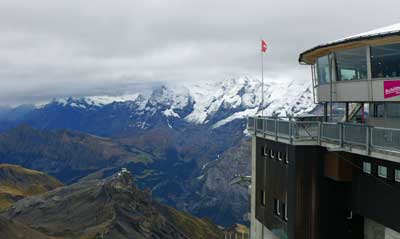
Both of those peak experiences are extraordinary and different from each other. Even so, compared to Jungfraujoch, Schilthorn is also faster and more comfortable on the way up and down. You can enjoy an excellent visit to Schilthorn in 4 hours or so (or a bit longer if you eat at the spinning Piz Gloria restaurant at the top), while a visit to Jungfraujoch requires closer to 6 hours.
NOTE: Schilthorn closes for maintenance for a week or two in late November most years.
Consider the Swiss Half-Fare Card instead
If you AREN’T going to be doing two or more of the long (and expensive) scenic train trips, you will get much better value out of the Swiss Half-Fare Card, which is explained a bit below.
Mt Rigi, near Lucerne, is 100% covered by the Swiss Travel Pass
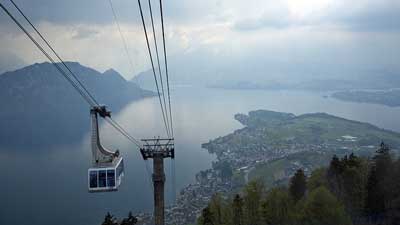
Is a Swiss Travel Pass right for you?
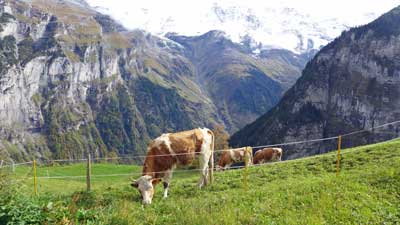
Most people only visit Switzerland for 5 or 6 days at most, so the 3-day and 4-day passes are the ones to focus on. But if you are staying for 8 days or more, those longer passes are almost certainly a great deal for you.
Long story short, if you plan on doing 2 of the more expensive scenic trains and the Jungfraujoch railway or the Schilthorn cable car, then the pass will save you money. Switzerland is expensive, but it’s worth it, and the travel pass can help make it a bit more affordable.
What the Swiss Travel Pass includes
- Free rail travel on normal trains and most scenic trains
- Discounted travel (about 50%) on popular tourist mountain trains
- Discounted travel (about 50%) on popular tourist cable cars
- Free travel on public transport in 75 towns and cities
- Free entry to around 500 museums in Switzerland
The Swiss Travel Pass covers the fare on the most popular scenic and panoramic trains. You can choose a normal seat in a regular carriage for no additional cost, but there is a supplement of CHF8 to CHF49 for a reserved seat in one of the special panorama carriages on these routes.
Prices of the 2024 Swiss Travel Pass
1st Class
- Adult 3-day Pass: CHF389
- Youth (4 to 25) 3-day Pass: 274
- Adult 4-day Pass: 469
- Youth (4 to 25) 4-day Pass: 330
- Adult 6-day Pass: 602
- Youth (4 to 25) 6-day Pass: 424
- Adult 8-day Pass: 655
- Youth (4 to 25) 8-day Pass: 469
- Adult 15-day Pass: 723
- Youth (4 to 25) 15-day Pass: 512
2nd Class
- Adult 3-day Pass: CHF244
- Youth (4 to 25) 3-day Pass: 172
- Adult 4-day Pass: 295
- Youth (16 to 25) 4-day Pass: 209
- Adult 6-day Pass: 379
- Youth (16 to 25) 6-day Pass: 268
- Adult 8-day Pass: 419
- Youth (16 to 25) 8-day Pass: 297
- Adult 15-day Pass: 459
- Youth (16 to 25) 15-day Pass: 328
Swiss Travel Pass Flex
This version costs a bit more, but you don’t have to use the travel days consecutively. It’s a great option for anyone who won’t be taking longer train rides each day.
- Adult 3 Flex days in 1 month (1st Class): CHF445
- Adult 3 Flex days in 1 month (2nd Class): 279
- Adult 4 Flex days in 1 month (1st Class): 539
- Adult 4 Flex days in 1 month (2nd Class): 339
- Adult 6 Flex days in 1 month (1st Class): 644
- Adult 6 Flex days in 1 month (2nd Class): 405
- Adult 8 Flex days in 1 month (1st Class): 697
- Adult 8 Flex days in 1 month (2nd Class): 439
- Adult 15 Flex days in 1 month (1st Class): 755
- Adult 15 Flex days in 1 month (2nd Class): 472
Where to buy the Swiss Travel Pass
The Swiss Half-Fare Card – A better option for many visitors
Far less confusing than the Swiss Travel Pass, you can instead get a Swiss Half-Fare Card, and it will be a better deal for many travelers. The price is lower and it’s much easier to do the math, and the discounts are greater on some things as well.
- Swiss Half-Fare Card for 30 days: Adults – CHF120 or US$129
What you get:
Those who buy the Swiss Half-Fare Card will get 50% discount on all trains, buses, and boats in Switzerland for up to 30 days, as well as 50% off all public transportation in 75 cities and towns.
>>>Buy the Swiss Half-Fare Card
Why the Half-Fare Card is a better deal for many
While the Swiss Travel Pass is a great deal for those doing many of the expensive scenic journeys and mountain sights within a few days, it’s not good value for those who are doing fewer of the expensive trips and/or those who are staying longer. Also, the Swiss Travel Pass only provides a 25% discount on the amazing Jungfraujoch Railway, which costs between CHF120 and CHF224 return depending on your starting point, while the Half-Fare Card provides a 50% discount.
The math is simple as well. You can just add up the cost of the trains, boats, and buses you’ll be taking while in Switzerland, and if the total is more than CHF240 or so, the Half-Fare Card will save you money.
Example itinerary:
- Zurich to Interlaken train (2nd Class): CHF50
- Schilthorn Cable Car: CHF112
- Jungfraujoch railway from Interlaken: CHF205
- Interlaken to Lucerne train (2nd Class): CHF33
- Mt Rigi roundtrip from Lucerne: CHF84
- Engelberg (near Lucerne) to Mt. Titlis Cable Car: CHF92
- Lucerne to Zurich train (2nd Class): CHF25
Total per person: CHF601
Total with Half-Fare Card (including price of card): CHF420.50
It would be tough to do all of those things in 4 days, although it is possible. If you bought a 4-day Swiss Travel Pass here is how it adds up:
4-Day Swiss Travel Pass: CHF259
Supplements for Schilthorn, Jungfraujoch, and Mt. Titlis: CHF203.25
Total cost: CHF462.25
Bottom line on the Swiss Half-Fare Card
Since the Half-Fare Card lasts 30 days and provides a larger discount on Jungfraujoch, it is better value for visitors who want to include that scenic top-of-Europe rail journey on their trip. The discounts also add up more quickly on Schilthorn and Mt. Titlis trips, just to name two examples, and you don’t have to take many longer rail journeys to get value out of the Half-Fare Card.
Swiss Saver Day Pass (A one-day unlimited travel pass)
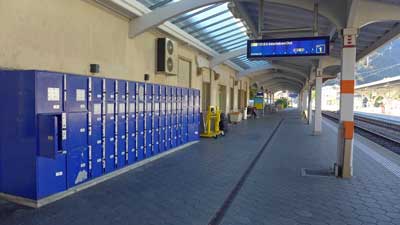
If you buy the Saver Day Pass at least 21 days in advance (and up to 60 days in advance) the 2023 cost is:
- 2nd Class (with Half Fare Card): CHF29
- 1st Class (with Half Fare Card): CHF82
- 2nd Class (with no Half Fare Card): CHF52
- 1st Class (with no Half Fare Card): CHF97
Once you research the normal cost of Swiss train fares you’ll see that the above prices are a very good deal for anyone riding more than 150 kilometers or so in a day. If you are just going, for example, from Zurich to Lucerne or Interlaken on a day, it’ll be cheaper to just buy that ticket individually. But if you are going from Geneva or Montreux to Interlaken or Lucerne then the Saver Day Pass will be much cheaper. Better still, you can use a Saver Day Pass to go from Interlaken to Geneva and back on the same day on the Goldenpass line and returning on the faster train through Bern, and it will still all be included for free.
If you don’t buy a Saver Day Pass at least 14 days in advance it’s more expensive, and if you only buy 1 to 3 days in advance it’s VERY expensive, so the key is to buy early. This is all confusing, but the Saver Day Pass should be a great option for many people only in Switzerland for one to three days.
Popular Swiss panorama scenic trains
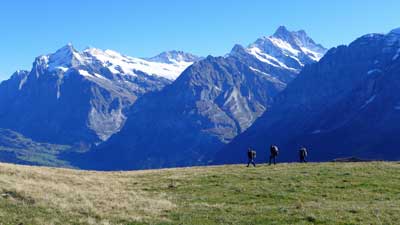
- Glacier Express
- Route: Zermatt to St. Moritz
- Train type: Panorama
- Journey time: 8 hours 3 minutes
- Distance: 291km
- 1st Class fare: CHF272
- 2nd Class fare: CHF159
- Compulsory seat reservation fee: CHF44 or 49
- Supplement for Swiss Pass holders: 13 to 33 for panorama carriage
- Bernina Express
- Route: Chur to Tirano and Lugano
- Train type: Panorama and bus
- Journey time: 4 hours 13 minutes and 3 hours 10 minutes
- Distance: 148km and 90km
- 1st Class fare: CHF113
- 2nd Class fare: CHF66
- Compulsory seat reservation fee: CHF32
- Supplement for Swiss Pass holders: 10 to 14 for panorama carriage
- GoldenPass Line
- Route: Lucerne to Montreaux
- Train type: Panorama
- Journey time: 5 hours 8 minutes
- Distance: 191 km
- Prestige Class fare: CHF131
- 1st Class fare: CHF96
- 2nd Class fare: CHF56
- Supplement for Swiss Pass holders: 8 to 15 for panorama carriage
- Gotthard Panorama Express (formerly Wilhelm Tell Express)
- Route: Lugano or Locarno to Lucerne
- Train type: Panorama and boat
- Journey time: 5 hours 21 minutes
- Distance: 182 km
- 1st Class fare: CHF164
- 2nd Class fare: CHF135
- Supplement for Swiss Pass holders: 39 to 49 for panorama carriage
- Swiss Chocolate Train
- Route: Montreux to Broc round trip
- Train type: Panorama or First Class
- Journey time: X hours X minutes
- Distance: 82 km
- 1st Class fare: CHF99
- 2nd Class fare: 89
- Supplement for Swiss Pass holders: 39
Popular Swiss scenic and theme trains
The scenic trains below are also extremely popular as sightseeing journeys rather than just as transportation, but can be used as both.
- Jungfraujoch round trip
- Route: Interlaken to Jungfraujoch
- Train type: special mountain train
- Journey time: 4 hours 41 minutes, round trip, plus time on top
- Distance: 73 km
- 1st Class fare: N/A
- 2nd Class fare: CHF224
- Supplement for Swiss Pass holders: 147 (so, a saving of CHF77)
- Gornergrat Railway
- Route: Gornergrat Railway
- Train type: Cog railway
- Journey time: 44 minutes return
- Distance: 10 km
- 1st Class fare: N/A
- 2nd Class fare: CHF90
- Supplement for Swiss Pass holders: 45
- Rigi round trip
- Route: Lucerne to Rigi
- Train type: Cog railway
- Journey time: 3 hours 25 minutes, plus time at the top
- Distance: 58 km
- 2nd Class fare: CHF78
- Supplement for Swiss Pass holders: None (this one is free with the pass)
- Mt Rigi Excursion (one-way and walk down)
- Route: Lucerne to Mt Rigi
- Train type: cogwheel train and/or cable car
- Journey time: 45 minutes up
- 1st Class fare: N/A
- 2nd Class fare: 49
- Supplement for Swiss Pass holders: 0
- Lotschberg Mountain Route and Centrovalli
- Route: Bern to Locarno
- Train type: Narrow gauge
- Journey time: 4 hours 40 minutes
- Distance: 212 km
- 1st Class fare: CHF158
- 2nd Class fare: CHF90
- Supplement for Swiss Pass holders: 5
- Jura round trip (Watchmaking Tour)
- Route: Neuchatel through Jura
- Train type: Regular
- Journey time: 3 hours 0 minutes
- Distance: 143 km
- 1st Class fare: CHF168
- 2nd Class fare: CHF108
- Supplement for Swiss Pass holders: 0
- Pre-Alpine Express
- Route: St. Gallen to Lucerne
- Train type: Regular
- Journey time: 2 hours 15 minutes
- Distance: 146 km
- 1st Class fare: CHF83
- 2nd Class fare: CHF47
- Supplement for Swiss Pass holders: 0
- Jura Foot Line
- Route: Basel to Geneva
- Train type: Regular
- Journey time: 2 hours 40 minutes
- Distance: 248 km
- 1st Class fare: CHF132
- 2nd Class fare: CHF75
- Supplement for Swiss Pass holders: 0
Popular Switzerland cable car rides
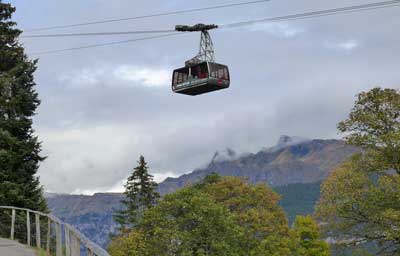
- Schilthorn
- Route: Stechelberg (Lauterbrunnen) to Schilthorn
- Train type: cable car
- Journey time: 1 hour
- 2nd Class fare: CHF108
- Supplement for Swiss Pass holders: 54
- Engelberg to Mt. Titlis cable car
- Route: Engelberg to Mt. Titlis
- Train type: cable car
- 2nd Class fare: CHF96
- Supplement for Swiss Pass holders: 46
The Swiss Travel Pass also includes free museum admission, but…
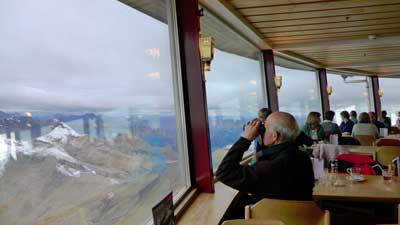
The problem is that the museums are only free on valid travel days, and almost no one would visit more than one or two museums with a Swiss Travel Pass. The trains and cable cars are so expensive that the pass gives very good value to cover those, so you don’t want to waste precious sightseeing time walking through a museum that only costs CHF10 anyway.
In other words, calculate the value of a Swiss Travel Pass on the travel savings only, and if you visit a museum here or there, then great. Most people are better off trying to squeeze in an additional train ride each day, and ignoring the museums. Switzerland is all about the outdoor scenery. As nice as the museums may be, they are not why you are there.
The pass includes free public transport in most Swiss cities
Similar to the free museum part of the offer, it’s best to ignore or minimize the value of free public transportation. It could be helpful in Zurich, but in most other Swiss tourist towns you won’t need much public transport. In fact, in Interlaken, each hotel or hostel guest automatically gets a card for free public transportation within the town (including between the two train stations).
So you might use a ride or two each day on public transport, but that won’t add up to much in terms of value of your Swiss Travel Pass.

Dear Roger,
I am planning to visit switzerland with my family (husband & 4 year old) from 25th October to 1st November. I am struggling to understand which option is the best for us as we would like to cover following:
25/10 – Arrival to Zurich
1/11 – Departure from Zurich
We wish to cover Basel, Lucerne, Interlaken and go to Rhine falls, zaungfro, titlis.
If you cold help us in planning our itinerary.
Can we take a boat to go near to the falls in october or will it be closed at that time?
Also which travel ticket would be most suited for us given we need to travel to 4 cities and also go to most touristic spots?
Rishika,
My best itinerary suggestions are all in my main article on where to go in Switzerland. I’m not a big fan of Basel so I don’t recommend it unless there are specific things you want to see there. Bern is a much more interesting and photogenic city, as well as being the capital.
It looks like the Rhine Falls boats go daily through October, so you should make it in time. Mid October to mid December are the off season in the mountains and some things are closed, but it looks like the boats go all the way through October.
The Half Fare Card would definitely save you money. A Swiss Travel Pass for 8 days might also be good, although you’d really have to figure out which things you’d be doing during that time and add up the prices compared to the Half Fare Card. If you do Schilthorn and Mt Rigi then the Swiss Travel Pass becomes even better value. Let me know if you have any other questions. -Roger
Dear Roger, my wife and I are so happy to have stumbled on your wonderful website before our first trip to Switzerland from 12 Sept to 26 Sept 2018.
We usually enjoy staying in just a few locations rather than hoppiong from place to place every night. So for Switzerland we have decided on Basel 12th September to 19th Sept, then Lucerne 19 to 26 Sept.
Could we ask you:
1. We are flying from Singapore and arriving London 12 Sept. What would you suggest for getting to Basel on the same day?
2. What day trips or activities you would recommend from Basel and Lucerne?
3. Based on our preference to base oursleves in Basel and Lucerne, would you recommend any of the Swiss rail passes?
(We will be flying home from Zurich, so I understand that is straightforward from Lucerne).
Thank you!
Zee
Zee,
1. You should be able to find a cheap flight from London to Basel on that day. Most likely you’ll be flying into Heathrow and the cheaper short flights tend to be from other London airports, so be careful of that when you book because getting between London airports is time consuming.
2. I find Basel to be a fairly boring city (my brother lives in Germany about 8 kilometers from there), but if you have a Swiss Rail Pass you can get anywhere in that part of the country by rail. My best recommendations are in the article about where to go in Switzerland. Bern is a more interesting city. In fact, if you can change from Basel to the Interlaken area or even to Bern I think you’d find it more enjoyable.
3. Yes, if you are going to base yourself in a city then you’ll be taking pretty expensive train rides probably every day. On a per-day basis the 15-day Swiss Travel Pass is quite cheap and it should save you a fortune on train rides and cable cars and boat and everything else. Have a wonderful trip. -Roger
Thank you Roger for your response. I was initially inclined for the 4 day swiss travel pass for 270 CHF but since i also have full day 5 when i intend to do the Mount Titlis and may be another excursion if time permits i was leaning towards half fare card. Also on the sixth day morning it’s just a one way ride from lucerne to Zurich airport. Is there an alternate way of combining Swiss travel pass and some other pass or should i just go with the half fare card which will cover all 6 days?
Peter,
Another option would be to get the Half Fare Card and then buy a Swiss Saver Day Pass (described in the article) for the days when you’d be spending the most. That way you can get the full use out of the Half Fare Card for your whole trip, and also save money on the days you’d take the most expensive trains. It gives you a discount on the Saver Day Pass if you have a Half Fare Card, so it’s really the best of both worlds. That is probably your best plan overall. -Roger
Hi Roger,
We are planning to visit next June and i came across your article about whether to purchase Swiss travel pass or Half fare card. We will be 2 adults and 1 child age 12. We are there for 5 nights and leaving on the sixth day morning and plan to do the following trips with Train and Cable cars:
1. Zurich to Interlaken West (staying in interlaken) (ONE WAY)
2. Interlaken Ost to Schilthorn (Train and Cable cars) (ROUND TRIP)
3. Golden Pass train from Interlaken to Montreux (ROUND TRIP)
4. Golden Pass train from Interlaken Ost to Lucerne (ONE WAY)
5. Lucerne to Mount Titlis (Train and Cable cars) (ROUND TRIP)
6. On Sixth day morning return from Lucerne to Zurich airport (One Way)
Do you think the Half fare card would be appropriate in this case? Can we buy the half fare card in advance before getting to Switzerland? Is there an app where we can buy the tickets using our half fare card and not go to the ticket counter?
Peter,
As I always say, you’d really need to add up each item to determine which is the cheapest way overall. I do think the Half Fare Card is probably your best choice, although it’s possible that a 4-day Swiss Travel Pass for your four middle days might end up being cheaper. Zurich to Interlaken and Lucerne to Zurich are not terribly expensive train rides, but Schilthorn and the Goldenpass are quite expensive. And if you did Mt Rigi and the boat ride instead of Mt. Titlis, that is also fully covered by the Swiss Travel Pass. So sorry to say, I’m not really sure, but definitely both of those are cheaper than individual tickets.
Another advantage of the Swiss Travel Pass is that you will almost always find other worthwhile things to use it on during your trip. If you can just hop on a train to another town 30 or 40 minutes away you might do it, but if you had to pay half of a CHF50 return fare you probably wouldn’t.
You can and probably should buy the Half Fare Card online and print it at home. It looks like SBB (the Swiss Rail company) does have a mobile app, and it will definitely let you buy half price tickets because most Swiss people get those for every journey. You might even be able to buy a Half Fare Card on the app itself. Let me know if you have any other questions. -Roger
Hi Roger,
I just came across your blog and i’m making a short trip to Switzerland in September from the 20-24 and am basing myself in Interlaken. I fly in and out of Zurich as well. I would very much like to make day trips to bern, lucerne and see Grindelwald for a little as well. I am really torn about what pass I should get if any, I plan on doing Schilthorn as well. I know i’m only going for a short time but am looking to get in as much as I can. I also know this isn’t a super detailed itinerary but i’m a little lost in planning for the first time in my life as i’m trying to be as budget conscious as possible in a very expensive place!
Amy,
If you do Schilthorn then it’s much easier to get value out of a full Swiss Travel Pass. And you might consider the Flex version for 3 days if you won’t be taking long or expensive trips each day. The Half Fare Card would definitely be better value than buying individual tickets, so it’s really just a matter of adding up the rides and things you’d do and comparing the price between a Swiss Travel Pass or the Flex version with fewer days or the Half Fare Card. One of those options will be cheapest. If it’s close I’d recommend going with a pass instead of the Half Fare Card because you’ll find other ways of using it when you are there. In other words, if another train or cable card trip is free then it’s easy to just do it, but if it’s half price you might still worry about the cost. Let me know if you have any other questions. -Roger
Hi Roger
Can you kindly assist as I can’t still figure out if I should get the pass or not?
Day 1 from Zurich to Interlaken
Day 2: Interlaken to Grinderwald – bernese oberland (excl Jungfrau)
Day 3: Interlaken to Blausee area and then head back to ZUrich, stopping by Bern/Lucern on the way back
I cannot tell from the Swiss pass whether it covers the cable cars from Grinderwald and up?? Can you kindly advise?
Thanks
Ann,
I think all of the passes cover the cable cars in that area, and now they fully cover Schilthorn all the way up. It really depends on how many trips you’d do during this time. Based on what you’ve written I think a Half Fare Card might be best, and you could also do one of those one-day passes mentioned in the article for that Day 3 because it looks like those train fares would be quite high. You get a discount on the one-day pass with the Half Fare Card, so it should be a great option. If you think you’ll do more train trips or cable cars then a 3-day Swiss Travel Pass might end up being best. The only way to be sure is to add up all of the things you’ll do and compare. Best of luck with this. -Roger
My wife and I are spending 2 weeks in Switzerland from 22nd September staying with friends in Zurich & Davos. and inquiring which Swiss travel pass to buy. We will be traveling between Zurich, Weinfelden, Lucern, Davos and st Moritz, also travelling to a couple of mountains I was thinking of Swiss Travel pass flex for 8 days. What do you think?
Ernest,
It sounds like an 8-day Flex pass could be great for what you are doing. As you’ve seen, those train fares on some of those routes are pretty expensive so being able to use a pass for the longer trips and the mountain tops should save money. The Half Fare Card would also be far better than buying as you go. It all really depends on how many trips you’d be doing. Best of luck with this. -Roger
Very informative article and really helpful to me as I am currently staying and working here in Geneva and would like to clarify something…
I already have the Swiss Pass (red card) but I was told it was only good to use within Geneva, I was wondering how can I avail the Half-fare card cause I will be staying here for more than 3 months.
Appreciate your reply!
Kevin,
My understanding is that nearly all Swiss residents who ride the trains more than a few times a year buy an annual Half Fare Card, and the 30-day version is mostly meant for short-term visitors and tourists. It looks like the 1-year version is only CHF185, so it’s not much more than the 30-day version for CHF120. You should be able to buy it at the main station in Geneva. That sounds wonderful and I’m sure you’ll have a great time exploring the rest of Switzerland while you are there. -Roger
Hi Roger,
Thanks for sharing the details on this website and more thanks for answering to so many questions – really very informative.
I must say, I have never seen anything detailed in such perfection on any of the travel sites in my life.
I am planning to travel to Switzerland in Aug 2018 with my family. We are 5 members, I have my parents, wife and sister on this trip.
Need your help with few questions for my itinerary below:
Day 1, 16th Aug – Reaching Zurich at 13:20, taking point to point ticket for Luzern, stay at Luzern
Day 2, 17th Aug – Mount Titlis, (Swiss Flexi Pass Day 1 of 3), stay at Luzern
Day 3, 18th Aug – Mount Pilatus (point to point), Rest in Luzern, local sightseeing, relax etc. stay at Luzern
Day 4, 19th Aug – Mt Rigi (first half of day), Travel from Luzern to Montreux by Golden pass Line, stay at Montreux (Swiss Flexi Pass Day 2 of 3)
Day 5, 20th Aug – Visit Chillon castle, Promenade, Lake, stay at Montreux
Day 6, 21st Aug – Travel Montreux to Schilthorn (first half of day) and Travel to Zurich in second half to board return flight @ 22:15 (Swiss Flexi Pass Day 3 of 3)
Questions:
1. Does this look good? considering the fact I am keeping some rest time intentionally
2. If I opt for 4 day flexi pass, what options should I include on Day 3 ? May be Mount Pilatus or something completely different?
3. What more can I add in Day 5 at Montreux?
4. Can I consider, to use Day 6 to travel by The Glacier Express from Visp to Chur on my way to Zurich in addition to my trip to Schilthorn?
Looking forward for your comments/ feedback,
Thanks in Advance
Vikas,
I’m always happy to hear that people find this useful, and I enjoy trying to help.
1. Yes, I think it looks very good and I think building in the rest time is wise. As you hopefully know, the weather at the top of those mountains can be unpredictable and you might have to go earlier or later if it’s foggy on top.
2. If you can add something else I would add more time in the Interlaken area. Schilthorn is an excellent taste of it, but most people agree that the Lauterbrunnen Valley and the peaks and views around it are the most dramatic in Switzerland. It looks like you’ve only allowed half a day in that area. You might even consider adding in Jungfraujoch, although it’s only partly covered by the Swiss Rail Pass.
3. I’ve only passed through Montreux and it’s a gorgeous area, but I haven’t heard many raves about the city itself. Especially if you have an extra day of a rail pass you might consider doing the Chocolate Train, which begins and ends in Montreux and includes a chocolate factory and a few other stops.
4. I also haven’t done the full Glacier Express, but I’ve heard great things and if you have time for it I would definitely consider it. From what I’ve seen it’s quite different from Schilthorn and Jungfraujoch as those are peaks above tight and scenic valleys, as opposed to a cross-country trip like the Glacier Express. I hope this helps. -Roger
Hi
Require your inputs on the below mentioned itinerary:
a) 21 August 2018 – Transfer from Paris to Adelboden (Switzerland)
b) 22 August 2018 – Visit Interlaken, Trummelbach Falls and Bern
c) 23 August 2018 – Leave from Adelboden to Mt Titlis,, Lucerne and then Zurich Lake
The above is part of group tour
d) 24 August 2018 – Visit Mt Rigis and Lucerne (and back to Zurich)
e) 25 August 2018 – Take Bernine Express (to and from fro Zurich)
f) 26 August 2018 – Rhine Falls, or any suitable option
g) 27 August 2018 – Take morning flight from Zurich to Bangalore
Please let us know the input for the above itinerary. I guess given my travel fro last 3 days, it makes sense for Swiss Rail pass
Regards,
Virendra
Virenda,
Now I’m seeing this different itinerary. If you can stay in Lucerne you’ll have a much better time than staying in Zurich, and you get a much better hotel for your money. If you do that you probably wouldn’t want a Swiss Travel Pass so you’d save that money, although you probably would want a Half Fare Card. Rhine Falls is close to Zurich so you might do that first and then head to Lucerne. -Roger